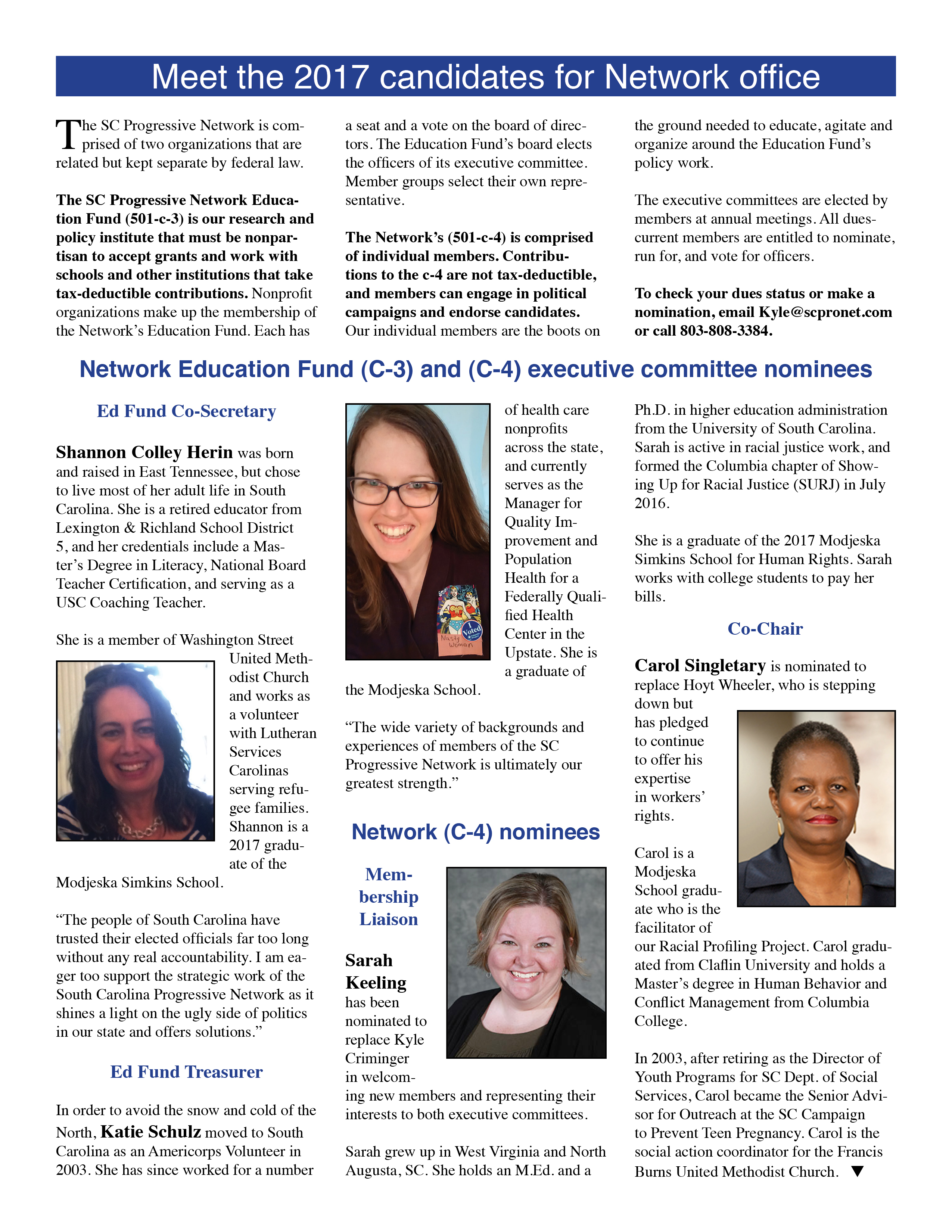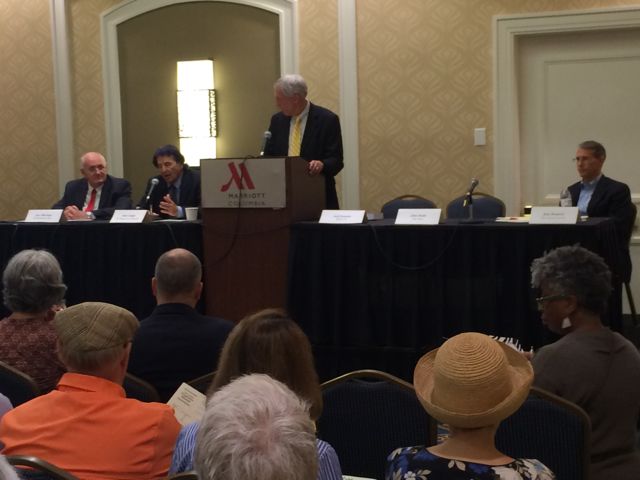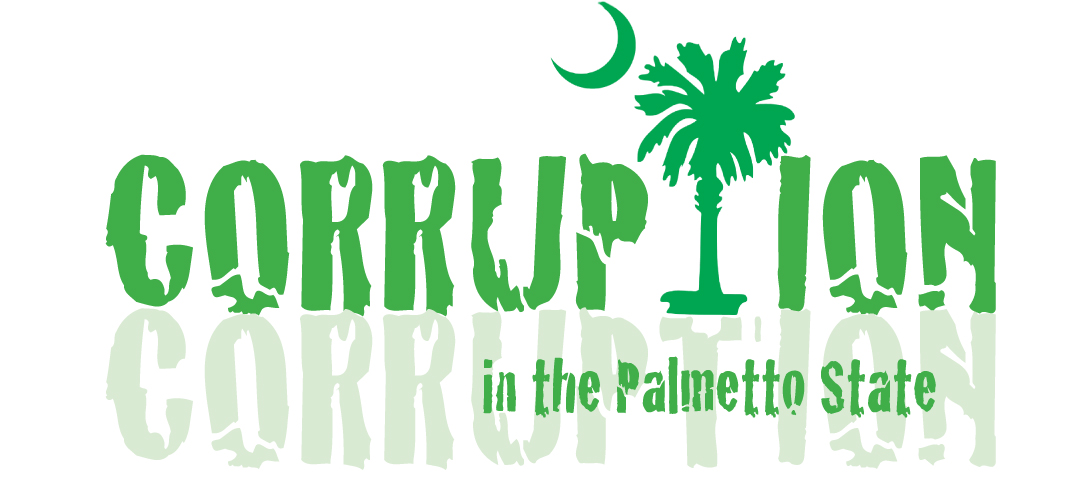Category Archives: Network News/Events
Reconnect, recharge, recommit
SC Progressive Network’s
Annual Fall Retreat
Sept. 29-Oct. 1
Santee State Park
 Join grassroots activists from across the state for the SC Progessive Network’s fall retreat, a weekend of fellowship, networking, and organizing. This is our first overnight meeting since politics imploded on the national and state level. The landscape has shifted dramatically, and we will take advantage of new opportunities while addressing new challenges.
Join grassroots activists from across the state for the SC Progessive Network’s fall retreat, a weekend of fellowship, networking, and organizing. This is our first overnight meeting since politics imploded on the national and state level. The landscape has shifted dramatically, and we will take advantage of new opportunities while addressing new challenges.
Friends and allies will gather at Santee State Park at its autumnal finest to talk politics, build alliances, sharpen strategies, and recharge our batteries.
Register NOW
Network projects are gaining traction and making great strides. We’ll hear updates on their work, and do break-out sessions for deeper dives in each.
- New Legacy Project (the Network’s youth coordinating body)
- Grassroots Alliance for Immigrant Rights (GAIR) and Young Immigrants in Action (YIA)
- Racial Profiling Project
- Democracy Project
Reps from our Network member groups will share their victories and challenges, and offer ways for you to join or collaborate.
We’ll get the latest scoop from the Network’s government watchdog, John Crangle, who reporters are calling for information and the governor and attorney general are calling for counsel. Since writing the book Operation Lost Trust and the Ethics Reform Movement, he is the state’s go-to guy for insight into the legislature.
We’ll get a legislative forecast from Progressive Caucus members Rep. Gilda Cobb-Hunter and Sen. Mike Fanning. We’ll discuss bills we are introducing, tracking, and backing. Find out about our inside/outside strategy – how it is working and how we are winning.
Come for a day or the whole weekend. We promise you will leave more energized and inspired than when you arrived.
 Friday is for early registration, beginning at 4pm; dinner on your own. Once you’ve registered, we will send program details and a list of things to bring.
Friday is for early registration, beginning at 4pm; dinner on your own. Once you’ve registered, we will send program details and a list of things to bring.
Cabins, tents, and RV options for overnight guests. Children welcome. Check Facebook event page for updates.
Register HERE
Questions? Call 803-808-3384 or email network@scpronet.com.
Offensive monuments: should they stay or should they go?
Becci Robbins
Communications Director, SC Progressive Network
Since white supremacists terrorized Charlottesville and shocked an addled nation, there is growing demand to take down offensive monuments in public spaces. Pressure is building in South Carolina as well, so we thought it time to revisit the SC Progressive Network‘s position, drafted after the Confederate flag was moved off the State House grounds and amid subsequent calls to remove the Ben Tillman statue.
Our position remains that instead of removing offensive monuments we reinterpret them to accurately reflect the state’s painful history. As we said in 2015, “taking them down will not change the past, nor will it help future generations understand and change the institutionalized racism they inherit. We support telling the truth about our former ‘heroes’ with additional plaques that explain their role in using race and class oppression to retain wealth and power.”
This is a teachable moment, a chance for a deeper look at these edifices we usually pass by without notice. Instead of erasing history, we should expand our understanding of it. When and why were the monuments erected? Whose interests did they serve and at what price? And who, really, are these figures occupying places of honor on the State House lawn? Chances are most South Carolinians don’t know.
We understand that our position is not shared among all of our members or allies, and we respect those who disagree. There isn’t a single valid way to respond to the assault on our shared values of equality and fairness. But whatever your beliefs, please don’t let your outrage misdirect your energy. There is critical work to be done in South Carolina to address the sources rather than the symptoms of our problems.
Our State House is littered with statues honoring the architects of systemic racism, codified in our very constitution. But we cannot wave a magic wand to make the monuments disappear. In fact, only our lawmakers can take them down, and then by an unlikely two-thirds vote, thanks to the Heritage Act they passed to ensure their enduring control.
The question activists must ask ourselves is not whether offensive monuments should come down, but how much time and energy are we willing to spend to that end.
 Network bumper sticker, circa 1996
Network bumper sticker, circa 1996
At its founding conference in 1995, the Network identified racism as the state’s most crippling and pressing problem. We joined other South Carolinians of good will and spent the better part of two decades fighting to get the Confederate flag off the State House grounds.
But all the years of heated debate and public protest did not move a Republican-controlled legislature unwilling to risk alienating its conservative base. The rallies, marches, editorials, town halls, national boycott – all fell on deaf ears.
It took the murder of nine people in a Charleston church for lawmakers to finally take the flag down. Even when the dead included one of their own, Sen. Clemeta Pinckney, debate on the floor was vicious and divided. Ultimately, it was political expediency during a campaign season that made them finally furl the flag. Photos of the killer posing with a Confederate flag forced the GOP to address an issue they could no longer ignore or defend. Make no mistake; it was pressure from the national party, not a moral epiphany, that moved Gov. Nikki Haley to act.
She is the perfect example of the liability in removing symbols of white supremacy while leaving its systems and structure untouched. Lawmakers can proudly claim the moral high ground (finally) while continuing to implement policies that disenfranchise and marginalize the least of us.
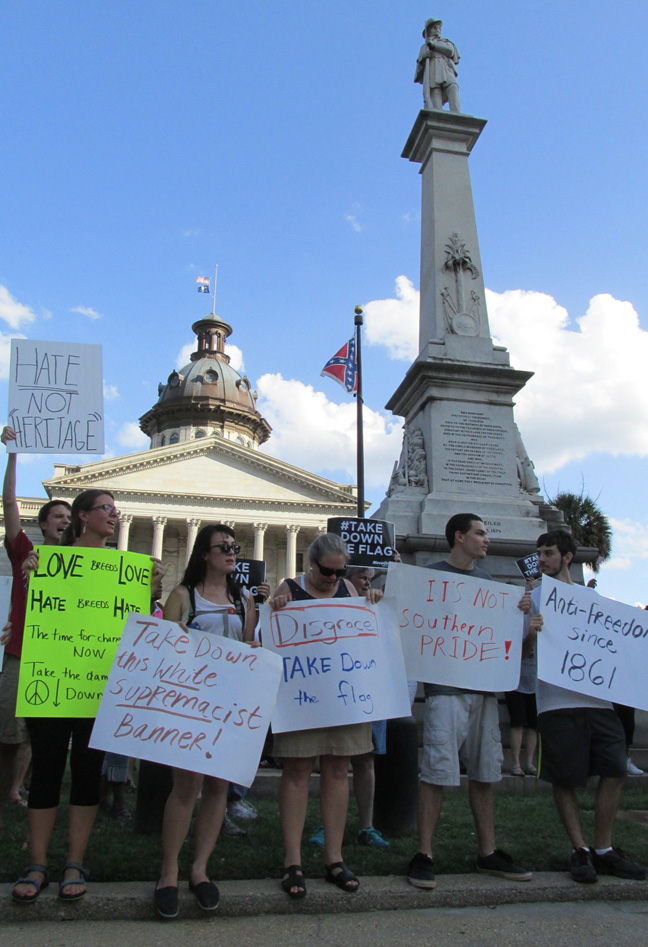 Watching the flag finally furled was a triumph, to be sure. But it came at a price. And what did it solve?
Watching the flag finally furled was a triumph, to be sure. But it came at a price. And what did it solve?
Since the flag came down, material conditions for the state’s most vulnerable citizens remain unchanged. Access to health care is uneven and inadequate. Public schools still struggle to offer our children minimally adequate education. The State House is embroiled in yet another corruption scandal. We are suffering the fallout from an irresponsible nuclear boondoggle that reflects a business-friendly political culture run amok. The state’s roads and dams are crumbling because lawmakers have starved infrastructure in the name of low taxes. The list is way too long.
So, yes, be outraged about the monuments, but choose your battles wisely. Statues never killed anyone; but public policy does so every single day.
Furthermore, symbols say a lot about who we are. As Modjeska Monteith Simkins said about the Confederate flag: Leave the damn rag up there. I’d rather see the Klan in sheets than in suits. As long as that flag flies from on top of that building you know what’s in the hearts of the people inside.”
• • •
The Network applauds those working to correct the historical narrative in South Carolina. To date, we know of plans for a poetry reading in front of the monument to Marion Sims, a visitation of the Tillman and Strom Thurmond statues by the New Legacy Project, and graduates of the Modjeska School are producing a tour of monuments on the State House grounds that is a departure from the one handed out in the gift shop.
Got nuclear mail? Here’s why
You may be one of the 700,000 SCE&G customers scratching their heads over getting a legal document in the mail that appears to be from the SC Public Service Commission. The lengthy notice, packed with dense legalese, lays out in blunt language SCANA’s plans to keep charging you for the next 60 years for the cost of building and tearing down their ill-conceived investment in two nuclear reactors.
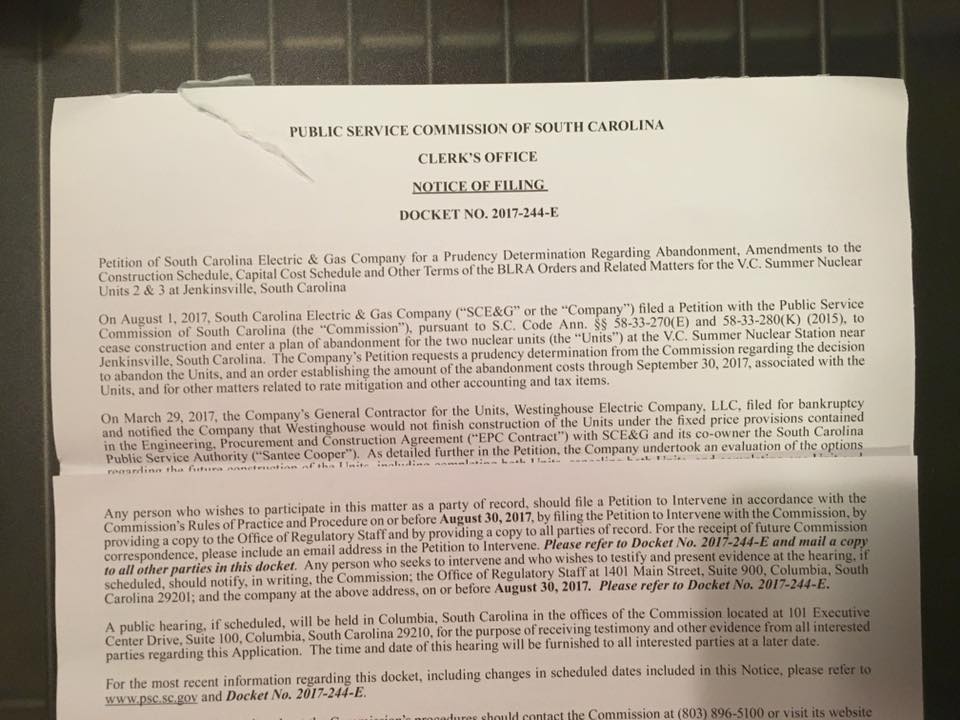 The notice reads like it could have come from the Sierra Club, as it casts the power company in a rather bad light. But that’s unlikely because the mailing cost more than a quarter-million dollars.
The notice reads like it could have come from the Sierra Club, as it casts the power company in a rather bad light. But that’s unlikely because the mailing cost more than a quarter-million dollars.
What happened? The power company had asked for a PSC hearing on getting its money out of ratepayers after abandoning the reactors. State law requires utilities to notify their customers prior to hearings on rate changes. Those notices are usually sent as a little slip of paper along with your bill. In this case, there was no billing cycle to meet the deadline for notice of the hearing, so the power company sent the notice as a separate mailing.
Anyone paying attention to the inner workings of the power company has noticed that its corporate attorneys are recent hires. It’s a good guess that someone will be looking for a new job, as a post card with a “notice of hearing” would have sufficed. The 700,000 letters to outraged customers made it clear that SCANA plans to continue to bill our grandchildren for electricity they will never receive from a plant that will never be built.
The SC Progressive Network will file to be a party in the PSC’s decision to bill the ratepayers for SCANA’s bad investment. “We will target the business-friendly religion that South Carolina lawmakers worship at the expense of reason and fairness,” said Network Director Brett Bursey. “This mess we’re now in is a direct product of a political culture that allows regulatory agencies to put profits over people.”
We won! Help us celebrate a rare victory in Lower Richland
“You’re doing God’s work,” Mary Posey told Network Director Brett Bursey when he called to share the good news that the small plot of land in Lower Richland she started paying for in 1997 was finally hers. On Aug. 8, she signed papers to make it official.
Nobody thought it would happen. The two took on one of the county’s largest landowners and won, after months of work and against all odds.
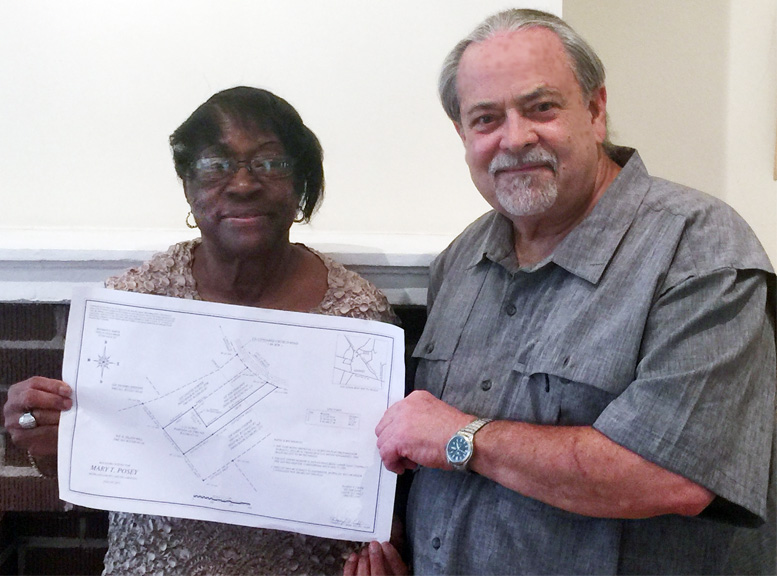 Brett Bursey and Mary Posey, holding the plat to her land.
Brett Bursey and Mary Posey, holding the plat to her land.
When Rep. Joe Neal died suddenly in February, the SC Progressive Network made a rare endorsement to support Wendy Brawley in the special election to fill his seat. We wanted to ensure that Rep. Neal’s replacement would continue to advance the work and vision he shared with the Network, an organization he helped found.
Brawley’s main opponent was Heath Hill, who inherited 68 square miles of Lower Richland from his father, Harold Hill, who died in 2002.
During the campaign, Bursey learned of Heath Hill’s reputation for questionable ethics. When he discovered that the mother of a longtime mutual friend was one of his victims, Bursey paid Ms. Posey a visit. They made this three-minute video, which was circulated online and on CDs across the district.
It was a brave move for the woman who didn’t want to make waves and had intended to let the matter go. Bursey, however, could not. After Brawley won the election, he went on a campaign to pressure Hill to follow through on the deal his father made with Posey in 1997, when she began making payments on the land she wanted to buy for her grandchildren.
When the elder Hill died, Posey owed $300 on the $4,920 debt. While the contract required Posey to pay off the note in 18 months or forfeit the land and money, Hill told her to pay what she could as she was able. But when she tried to make the final payment to Heath Hill, he said she’d waited too long. He kept the money and the land.
Without bank records to prove payment, lawyers advised that there was no legal recourse. But never one to give up without a fight, Bursey went to Hill directly and asked him to do the right thing, and shared with him some of the stories and research he’d uncovered during the campaign. Bursey then took the information to Hill’s attorney.
On Aug. 8, Posey took $300 to the attorney’s office, signed the deed and, after 20 years, took ownership of the land.
• • •
We think this is an excellent reason for a party!
Help us celebrate a rare win over big money. Join friends on Tuesday evening Aug. 22 beginning at 6:30 for a casual get-together at the Fish Line restaurant – owned by Posey’s daughter – at 4201 Bluff Rd. The event is free, but you can enjoy a fish dinner for $10 if you RSVP by Aug. 18. The restaurant, which is usually closed on Tuesdays, needs a head count.
Call 803-808-3384 or email network@scpronet.com for information or to make reservations. You can also share/RSVP on Facebook.
Nuclear power play
Brett Bursey
SC Progressive Network Executive Director
Gov. Henry McMaster has called for legislative hearings into what may be the biggest theft in state history, a multi-billion dollar nuclear disaster.
I can save them some time, because I witnessed the crime first-hand and know who pulled off the heist.
Those blaming SCE&G for shaking down consumers are chasing the wrong culprit. SCE&G is an investor-owned monopoly run by large banks and investment funds whose mission is to make money for its stockholders. It was no surprise, then, that they took advantage of an opportunity to socialize the risk and privatize the profit of building nuclear reactors. That’s what profit-driven corporations do.
South Carolina is one of two states that allow for-profit utilities to charge consumers for electricity they may never get. It wasn’t always this way.
In 1984, after five years of hearings, the VC Summer reactor in Jenkinsville was making electricity, and consumers could finally be billed. The SCE&G reactor was the last to be licensed under the old rules. Nukes were too long, risky and expensive a venture until President George W. Bush championed the Energy Policy Act of 2005. The Act provided a generous package of subsidies to build new reactors, including loan guarantees, federal risk insurance, and tax credits.
Still a risky venture, energy industry groups pushed for federal regulations that would streamline the licensing of reactors. In 2007, the Nuclear Regulatory Commission answered their prayers by offering combined construction and operating licenses (COL). The NRC received 18 applications from utilities around the country for the new one stop license, but only two utilities stayed in the game.
So why were reactors built only in South Carolina and Georgia?
In 2007, a bill was introduced in the SC state legislature to let SCE&G charge customers in advance for future nuclear electricity. Georgia followed suit a few years later. Building the nuke, referred to as construction work in progress (CWIP), had previously been a financial burden on the stockholders who stood to benefit from the investment. The South Carolina bill was championed by Rep. William Sandifer and Sen. Tommy Moore, the Democratic candidate for governor that year.
At the time, Sandifer was a Task Force chair of the American Legislative Exchange Council (ALEC), a corporate lobbying group promoting state legislation to maximize corporate profits. The “Base Load Review Act” was titled as a consumer friendly law to “TO PROTECT SOUTH CAROLINA RATEPAYERS BY ENHANCING THE CERTAINTY OF INVESTMENTS IN THE INFRASTRUCTURE OF ELECTRIC UTILITIES.”
The bill – written by utility lawyers and lobbyists – ensured that SCE&G would get a set percentage of return based on its investment. SCE&G is currently guaranteed a healthy 10.5 percent on top of what they spend, so the more they spend, the more they make. The bill also holds the power company harmless if they “abandon the project after a prudency determination” by the Public Service Commission. The bill was sent to the floor without a public hearing.
In a perfect example of a done deal – and with rare expedience – the House introduced the bill on April 17, 2007, had a second reading on the 18th, and final reading on the 19th. The bill passed the House with a 104-6 vote, with progressive legislators voting in favor and only a small bipartisan group voting no.
Sen. Moore drove the bill in the Senate, and received $74,750 from electric companies that year. He also got the maximum $7,000 contribution from the law firm SCE&G hired to “secure” the legislation. The bill passed the Senate with unanimous consent without a roll call vote.
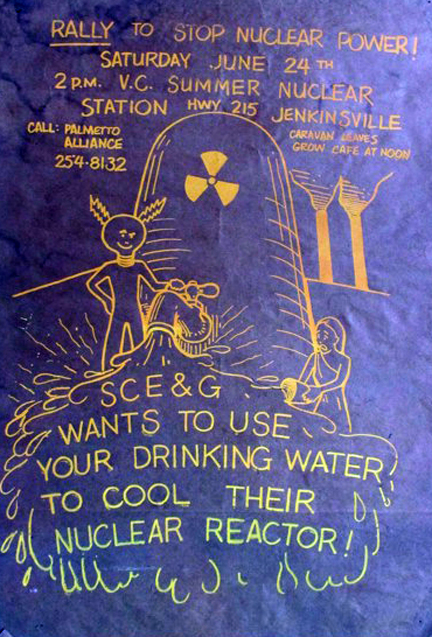 Before the SC Progressive Network, there was GROW, which had a long history of challenging the power company. This poster is from 1979.
Before the SC Progressive Network, there was GROW, which had a long history of challenging the power company. This poster is from 1979.
The lobbying frenzy to promote the 2007 bill is a case study in following the money. Sold as a way to save consumers from a big rate hike at the end of construction, SCE&G’s electricity bills now include nearly a 20 percent increase to pay for the boondoggle.
Not unrelated, electric utilities and the nuclear industry made 619 contributions totaling $514,955.92 to lawmakers in the legislative session leading up to the vote. (See 2006 utility contributions to state house candidates.)
The McNair law firm, namesake of former Democratic Gov. Robert McNair, still boasts about delivering the vote for its corporate clients on its web site. “Working on behalf of a Fortune 500 energy-based holding company that serves customers in South and North Carolina and Georgia, McNair helped secure utility legislation from the South Carolina legislature in 2007. Called the Base Load Review Act, this law is intended to allow a utility to recover prudently incurred capital and operating costs associated with new nuclear or coal-fired base load electric generating facilities larger than 350 megawatts.”
The McNair firm, with over 100 lawyers, gave $64,000 to candidates who voted for the bill that SC&G paid the firm to work on. Since lobbyist are prohibited from making donations to candidates, the firm’s work for the power company, and their donations to candidates, was characterized as legal work. There are no public records on how much money SCE&G gave to the McNair firm. (See 2006 McNair Law Firm contributions to State House candidates.)
The villain in this billion-dollar theft isn’t the for-profit corporation or their lawyer/ lobbyists; it’s the politicians who allow money to corrupt public policy.
To discover the guilty parties, the governor and state lawmakers need do no more than look in the mirror.
• • •
As attorney general in 2007, Gov. McMaster received the maximum campaign contributions from both SCE&G and the McNair firm. We hope he will support legislation the SC Progressive Network is promoting for more transparency in campaign finance disclosures and public financing for the office of attorney general.
Brett Bursey was the sole intervener in the five years of federal licensing hearing for the original VC Summer reactor from 1979-1984. Without his intervention, the SCE&G reactor would be the only nuclear generating facility ever licensed without public hearings.
The National institute on Money in State Politics contributed research for this piece. The SC Progressive Network contributed the original data for its searchable database of SC legislative and constitutional office candidates since 1998. You can find who your legislator is getting money from by clicking here.
Latest Modjeska School graduates already putting new skills to work
 These students (plus a few who couldn’t make it to the graduation party) have been meeting in Columbia at the historic Seibels House twice a month since March to learn a people’s history of South Carolina and tools to be more effective community organizers.
These students (plus a few who couldn’t make it to the graduation party) have been meeting in Columbia at the historic Seibels House twice a month since March to learn a people’s history of South Carolina and tools to be more effective community organizers.
On Sunday, a third class matriculated from the Modjeska Simkins School for Human Rights, a project of the SC Progressive Network launched in 2015 to help build and sustain a state-based movement for social change.
As they picked up their diplomas, the graduates shared their thoughts about the experience.
Lauren Greene said, “This class absolutely exceeded my expectations – the material, the presentations, the guest speakers. It was really phenomenal. There was so much I didn’t even know I didn’t know.”
Carol Singletary said, “The school helped me understand why we are where we are now and why we have not gone as far as we should have. I met some wonderful people who are as committed as I am to bring about change and continuing to work together to make sure that some good things happen in South Carolina.”
 Graduate Carol Singletary and Network Co-chair Marjorie Hammock
Graduate Carol Singletary and Network Co-chair Marjorie Hammock
Richard Sylvester hadn’t planned on taking the course, but after dropping his wife off at the first class and seeing the curriculum, he decided to enroll, too. “I was hesitant to come at the beginning because I knew I would learn things that would just make me mad. I hope I can do something to help rectify the things that are less than they could be”
His wife, Shannon Herin, thanked him “for sticking with me. That made it extra special. It was an amazing curriculum – and if you’re like me you will still be reading that curriculum for many years. This is a very smart community of activists because we’re not just angry. This is a group that wants to get smart, stay smart, and to be intentional about their actions. That’s a great strength.”
She said the day included a personal point of celebration. “This little blue dress was worn on that day in November when I went to vote for the first female president. You can still see the tear stains on it. I put this on the back of my door, and wasn’t going to put it back in the closet until I did something. So it means a lot that I’m wearing it today.”
 Shannon Herin (center), her mother Martha, and fellow graduate Annette Bethel
Shannon Herin (center), her mother Martha, and fellow graduate Annette Bethel
“The school opened my eyes to the fact that it’s no accident that we’re in the situation we’re in; it’s intentional,” Melissa Watson said. “Sometimes you feel like you’re not doing enough in the community, particularly when you compare yourself to the big names on the national stage. To see local icons’ work motivated me to want to work.”
Longtime political activist Tim Liszewski said, “Knowing there are people younger than I am who are actually taking up the cause gives me hope and makes me less angry. Let’s make some change that lasts.”
Donald Martin is not a South Carolina native, so was glad to learn more about its history. “I grew up in the era of Jim Crow, so that wasn’t surprising to me; what was surprising is to look across the room and see young people and older people, and I thought we wouldn’t still be talking about this. It just shows that the struggle is not over. I feel the spirit of Modjeska Simkins inside me. That’s why I came to join this movement – and this is a movement.”
 Sherri Simmons said, “It was a great opportunity. I was never bored. It has been an eye-opening experience to learn about the state.”
Sherri Simmons said, “It was a great opportunity. I was never bored. It has been an eye-opening experience to learn about the state.”
Thomas Hammond said his father gave him the money to take the course. “I wanted to talk about him because the other thing he gave me was understanding how important it is to know your history, where you come from. So taking this class and being involved with the Progressive Network has been an extension of what my dad gave me. It would be easy to be ashamed about where you come from, but I feel like if you make the effort to overcome your history then you don’t have to feel ashamed.”
Beverly Frierson and her sister Delaine Frierson took the class together. They have long been very active in the Democratic Party. The class made them better understand the systemic flaws within the party structure, and the need for a more strategic approach to progressive politics in the Palmetto State.
“Throughout history,” Beverly Frierson said, “the powers that be have promoted an us-against-them philosophy for the benefit of the rich and powerful. It’s so ingrained that either people are too disillusioned to take action, or they act against their own interests or – even worse – sometimes they form alliances with the oppressor.”
She said the class made her feel empowered. “The most impactful thing to me is understanding that human beings are capable of transformation. We have to have faith in the capacity of people to change. It starts with us.”
Network Director Brett Bursey who, along with Modjeska School Faculty Coordinator and USC’s Caroliniana Library historian Graham Duncan, constructed the curriculum, said the school has been one of the most gratifying and promising projects he’s worked on in his 49 years as an organizer. “The Modjeska School is meeting a critical need for progressive leadership at just the right time,” he said. “I’ve been impressed with the students’ understanding that a revolution of social values is a lifetime commitment. They are the agents of change.”
Before leaving, the class split into groups to talk about next steps for the projects they have committed to working on in the coming months. Congratulations to them all!
We thank guest speakers Dr. Wil Goins, Dr. Bobby Donaldson, Tom and Judy Turnipseed, Tootsie Holland, Dr. Hoyt Wheeler, Lewis Pitts, and Jack Bass. Thanks, too, to former Modjeska School graduates Kyle Criminger and Daniel Deweese, who volunteered to set up and break down each session.
Class war and cultural revolution: a conversation
As part of the Modjeska Simkins School‘s Sunday Social series, the public is invited to hear recovering attorney Lewis Pitts on June 4 at the Seibels House, 1601 Richland St., downtown Columbia between 4 and 6pm. Pitts is a dynamic speaker with an impressive resume and a trove of stories from the trenches.
• • •
Lewis Pitts was so dismayed by the legal profession that, after 43 years of practice, he asked the NC State Bar to allow him to resign. He was disturbed by the growing tendency of attorneys and law firms to put profit before the people they were supposed to serve.
“My resignation is because I see an overall breach by the Bar as a whole of the most basic of professional conduct and ethics such that I do not want be be associated with the Bar,” Pitts wrote in a 2014 letter to the Bar. “I do not mean to be mean or flippant. The ministry of law has been a powerful force in my life and I have had the pleasure of working with many terrific people in pursuit of justice — lawyers and non-lawyers. I want these parting words to stir your minds and hearts into reflection, boldness, and transformational action.”
The case went to the state Supreme Court, where Pitts was granted the exit he sought.
A South Carolina native, Pitts graduated from Wofford College and USC’s law school. He practiced in DC and spent nearly 20 years at Legal Aid of North Carolina, where he founded the statewide children’s unit and fought the schools-to-prison pipeline.
Pitts was SC Progressive Network Director Brett Bursey’s lawyer after he was arrested for threatening President George Bush with a “No War for Oil” sign. (Read about the case in this blog post.)
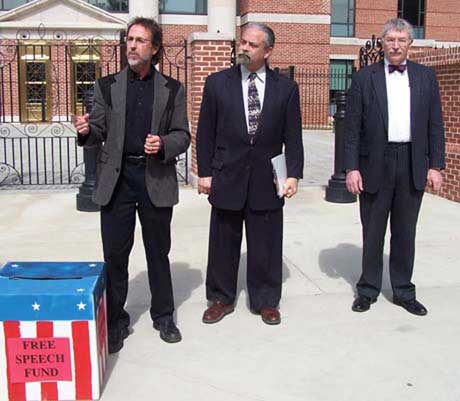 Lewis Pitts (left), Brett Bursey, and attorney Jay Bender
Lewis Pitts (left), Brett Bursey, and attorney Jay Bender
Bursey and Lewis go way back. Pitts represented the Natural Guard protesters at the Bomb Plant (Savannah River Site), and decided to go to jail with them. He was an attorney in Karen Silkwood’s wrongful death suit, took part in civil disobedient arrests at nuclear facilities around the country, was lead attorney in the successful civil suit against the Klan and Nazis for the murder of five Greensboro activists in 1979.
“From my earliest days as a lawyer, I have been concerned that the role of our profession has been to serve and protect the political and business establishment and not to uphold rule of law,” Pitts wrote in his resignation letter. (Read the letter here.)
He told a Greensboro reporter last year that there was no single incident that made him want to step away. “It was like the hypocrisy was eating me physically and psychologically.” He called his appeal “a desperate plea” in “some explosive times when the rule of law really needs to mean something. I guess it’s time for our profession to undergo a moral checkup.”
Lewis is in Columbia to teach a class of the Modjeska Simkins School.
Government watchdog John Crangle offers dim view of Quinn hearing
John Crangle spent all day Tuesday at the hearing on Rep. Rick Quinn’s motion to remove special prosecutor David Pascoe from the criminal case against him by alleging that Pascoe has a conflict of interest. Crangle, the SC Progressive Network‘s government relations director and author of the book Lost Trust, has become the go-to guy for reporters covering the growing public corruption scandal at the State House.
Crangle suspects that Quinn’s high-priced attorneys didn’t have any law or evidence on their side to prove Pascoe has a conflict of interest, so they spent hours arguing that SLED agents may have improperly seized evidence from Quinn’s office.
Last week, Quinn was indicted on two counts of misconduct in office for not reporting more than $4.5 million in payments he received between January 1999 and this April. He also is accused of funneling more than $270,000 in House Republican Caucus funds into his father’s consulting firm, Richard Quinn and Associates.
Quinn has called the investigation a “partisan witch hunt,” and claims that Pascoe’s political ambition causes the conflict of interest.
In this brief update, Crangle says that the SLED search had no relevance to Quinn’s motion to dismiss Pascoe, and he was surprised that the judge tolerated the drawn-out testimony. The judge promised a ruling on Quinn’s motion in two weeks.
Click HERE to listen to Crangle’s short update from the inside.
John Crangle speaks at the SC Progressive Network’s May 17 forum on political corruption in the Palmetto State. With him on the panel are (from left, Sen. Mike Rose, Ret., WIS-TV reporter Jack Kuenzie, and Rick Brundrett with The Island Packet. See more photos from the packed-house event in our photo album.
Forum to explore causes and cures of SC political corruption
May 17 • 6-9pm
Marriott, 1200 Hampton, downtown Columbia
Free and open to all.
Is political corruption endemic, or can it be treated? That’s the question at the center of a public forum on Wednesday that will offer three panel discussions with some of the state’s experts.
As yet another political scandal threatens a growing number of South Carolina lawmakers, it is clear that we have a problem. The bad news is that our system is broken. The good news is that we believe reform is possible if enough people demand it.
The SC Progressive Network has been working on reforms to reduce the causes of corruption for more than 20 years. We’ve concluded that unless we can make serious structural and cultural changes in the way we practice democracy in South Carolina, we will keep repeating the same patterns of abuse that will only further erode public trust.
It is no surprise that money and power are the interrelated causes of our lack of representative democracy and the resulting corruption.
Historically, our incumbent legislators, who win office with the existing rules and voters, have been disinclined to change a system that is working fine for them. They have resisted efforts to make it easier to vote, and ahve ignored legislation that would create a system of public financing for the General Assembly. A young Sen. Clementa Pinckney and Rep. Joe Neal were the bill’s prime sponsors, which has been introduced every session since 2000 but has yet to make it to the floor.
While voter participation continues to shrink, bills for universal voter registration have likewise languished without hearings. Last November, fewer than 14 percent of registered voters elected 77 percent (131) of the 170 members of the SC General Assembly. The winners in 94 of these districts faced no opposition at all, yet raised over $4 million. What did they do with all that money?
The purpose of the forum is to initiate an honest discussion about the state of our democracy in South Carolina. How did we get here? Whose interests are now being served? Can we reduce the influence of money in politics? Join us for a timely conversation. The event is free and open to all. RSVP/Share on Facebook.
• • •
Welcome and statement of purpose: Marjorie Hammock and Kyle Criminger, SC Progressive Network Co-chairs
Panel I – Modern History of Political Corruption
Moderator: Jack Kuenzie, WIS-TV
Rick Bundrett, The Island Packet
John Monk, The State
John Crangle, SC Progressive Network
Sen. Mike Rose, R-Dorchester, Ret.
Panel II – Causes of Corruption
Moderator: Ken W. Gaines, USC School of Law
Sen. Mike Rose, R-Dorchester, Ret.
Cassie Cope, The State
Lynn Teague, League of Women Voters of SC
Ashley Landess, SC Policy Council
Brett Bursey, SC Progressive Network
Panel III – Reform is Possible!
Moderator: Brian McConchie, WACH-TV
Sen. Phil Leventis, D-Sumter, Ret.
Sen. Joel Lourie, D-Richland, Ret.
Rep. James Smith, D-Richland
Octavia Williams-Blake, Florence City Council
Rep. Gilda Cobb-Hunter, D-Orangeburg

